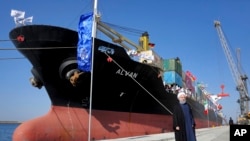India and Iran have signed a 10-year contract to develop and operate the Iranian port of Chabahar, which New Delhi envisages as a strategic trade route to landlocked Central Asian republics, allowing it to bypass rival Pakistan.
India said the deal has unlocked new avenues for trade. But the United States, whose ties with Iran have worsened, has warned of the potential risk of sanctions on anyone considering business deals with Tehran.
Analysts in New Delhi say the threat of sanctions could dampen hopes of turning the port into a trading hub.
The agreement was signed Monday in Iran’s Chabahar town by India’s Shipping Minister, Sarbananda Sonawal and Iran’s urban development minister Mehrdad Bazrpash.
"Chabahar Port’s significance transcends its role as a mere conduit between India and Iran. it serves as a vital trade artery connecting India with Afghanistan and Central Asian countries,” Sonawal said after the signing.
The agreement gives India 10-year access to use the port.
"We are pleased with this agreement, and we have full trust in India," Iranian minister Bazrpash said.
India began helping to develop Chabahar port by building new cargo berths and terminals in 2016 after Washington eased sanctions on Iran – they were reimposed by the Trump administration in 2018.
After India and Iran signed the 10-year deal, U.S. State Department spokesperson, Vedant Patel, told reporters that U.S. sanctions on Iran remain in place, and that Washington will continue to enforce them.
"Any entity, anyone considering business deals with Iran, they need to be aware of the potential risk that they are opening themselves up to and the potential risk of sanctions," he said.
Chabahar is India’s first major overseas port venture and for New Delhi, it is an important part of its strategy to improve links with resource-rich Central Asian republics and Afghanistan, access to which has been hampered due to the decades long hostile relations between India and Pakistan.
But Indian analysts say U.S. sanctions on Iran have long cast a shadow on the project and hampered New Delhi from realizing the port’s potential. While the Trump administration had exempted the Chabahar project due to the role India was playing in Afghanistan’s reconstruction, Washington's ties with Iran have again worsened due to Tehran’s support for Hamas since the Israel-Hamas war erupted last October.
“Chabahar has long-term potential. But due to U.S. sanctions on Iran, it has not turned out to be the gamechanger that India had hoped because private Indian companies have been and will be reluctant to use the port,” according to Manoj Joshi, Distinguished Fellow at the Observer Research Foundation in New Delhi. “There has been no real sharp rise in India’s trade with Central Asia.”
However, Indian stakes in Chabahar have strategic significance — they are part of India’s outreach to Iran. “Where India is concerned, good ties with Iran are a pushback against Pakistan, which has a land blockade where India is concerned,” said Joshi.
Chabahar is also seen as a counter to China’s development of the Gwadar port in Pakistan. Located close to Iran’s southeastern border with Pakistan, the deep water Chabahar port is less than 100 kilometers from Gwadar.
Beijing’s investments in ports and infrastructure in India’s neighborhood as part of its Belt and Road Initiative have raised concerns in New Delhi and prompted it to expand its maritime footprint.
Indian officials expressed optimism about the ten-year deal that India and Iran have inked. "It will clear the pathway for bigger investments to be made in the port,” foreign minister Subrahmanyam Jaishankar told reporters Monday.
India will invest $120 million in infrastructure development and extend a $250 million line of credit to Iran.
The "long-term contract symbolizes the enduring trust and effective partnership between India and Iran," Indian minister Sonawal said.




